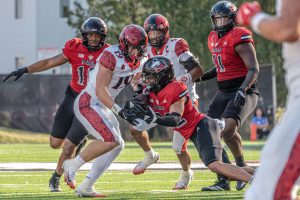UP has high officer-student ratio
January 21, 2004
With the addition of eight officers earlier this month, University Police now is among the state leaders in student-to-officer ratios. At the same time, changes in the police ranks are leading to fewer arrests.
The additional officers bring UP’s total to 46 sworn officers, a number that finally brings police to the level where they should be, UP Lt. Matthew Kiederlen said.
Forty-six officers places NIU third against state schools in Illinois, behind University of Illinois-Chicago with 60, and the University of Illinois Champaign-Urbana with 55.
For years, UP operated with roughly 35 officers, Kiederlen said. The Department of Justice grant will allow them to work at a higher number.
“In the past, we were constantly trying to catch up,” Kiederlen said. “We were always in response mode, as opposed to peace keeper.”
Now, Kiederlen said, police can better prevent crime.
One way UP began preventing crime was to have extra officers patrol the residence halls.
It was part of an initiative, as stated by UP Chief Donald Grady last fall, that would make police more visible to the community.
The newly hired officers, Grady said at the time, also would spend time in the residence halls.
UP’s initiative of preventing crime before it happens has helped bring arrest rates down, Kiederlen said. This year, UP officers have made only three arrests, with two coming on the first of the year and the third being a warrant arrest last week.
Last year, UP made a total of 132 arrests. In comparison, officers at U of I made 338 arrests last year. With arrests down and officers up, Kiederlen said he can see why some may question the need for new officers.
“It really depends on how you look at police and what they are supposed to do,” Kiederlen said.
“Catching crime is like a neat board game,” Kiederlen said. “But being able to prevent crime is what a department should be measured on.”
Crime prevention is something other university police departments say they have had problems with.
At Illinois State University, Sgt. Derek Ronnfeldt said his departments’ lack of officers is hurting the type of programs they can implement.
ISU has only 22 sworn officers, and with a student population over 20,000, they have the worst student-to-officer ratio in the state.
“It’s low,” Ronnfeldt said, “but without the funding, you can’t hire more.”
Ronnfeldt said it is impossible to say how many officers would be sufficient. It all has to do with what type of policing you are doing, he said.
One place where policing takes an entirely different approach is UIC. Sixty officers at a university where the majority of the student population commutes may seem like a lot, but UIC police do a lot more non-university-related work like directing traffic, UIC Police Lt. George Ruckrich said.
“The demographics are different,” Ruckrich said, about the urban environment.
At Southern Illinois University, where demographics are similar to NIU, police say they would love to have numbers similar to NIU.
With only 36 officers, Capt. Todd Sigler said his department is down almost an entire shift, meaning that officers have to spread out throughout the day.
Not everyone can be on the street, Sigler said. Like ISU, Sigler attributes the lack of officers to lack of funding.
While he did not know enough about the department to comment on NIU’s situation, Sigler said any department would take advantage of being able to get federal funding for officers.
“It would be extremely beneficial to be more visible to the public,” Sigler said.
And being more visible, Kiederlen said, is what UP is trying to maintain.
UP’s new officers are at the police academy, and they will join the force after completing their 11-week training sessions.






